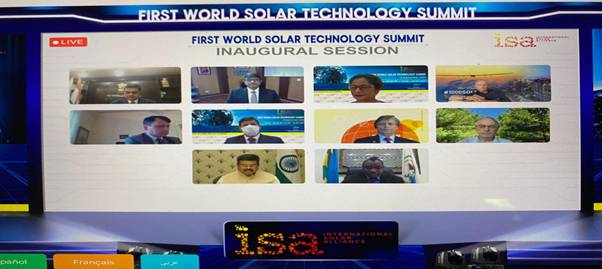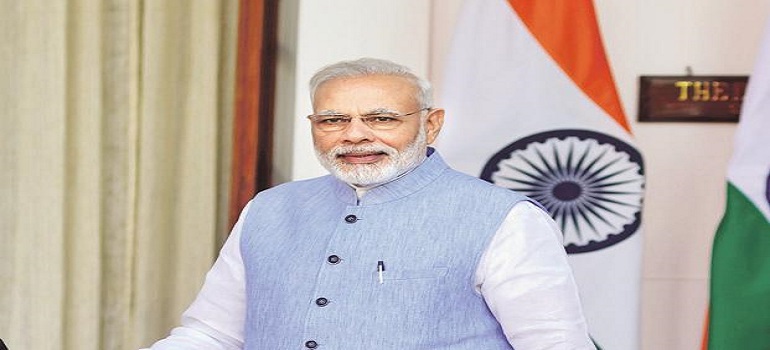
Prime Minister Narendra Modi in a message at the inaugural session of First World Solar Technology Summit read out by R.K. Singh, the President, International Solar Alliance (ISA) Assembly and Minister of State (I/C) for Power and New & Renewable Energy, said, that technology holds the key to scale up the use of solar energy.
Technological achievements have already brought about a significant reduction in the price of solar power. A further reduction in the cost will provide a major boost to the use and expansion of renewable energy. He expressed confidence that the summit will help in help in developing new technologies and ensure that they become available to all.
World Solar Technology Summit (WSTS) organised by ISA and FICCI today aims to bring together key stakeholders – leading academic scientists, technology developers, researchers and innovators to present and discuss the recent highlights of solar technologies, cost-wise; technology-wise, technology transfers, challenges and concerns in the field.
The main objective of WSTS is to showcase to member countries the state of the art and next-generation solar technologies worldwide and to give an opportunity to decision-makers and stakeholders to meet, and discuss their own priorities and strategic agenda towards a larger integration.
Prime Minister re-iterated that Five years ago, world leaders had taken a pledge to restrict the rise in global temperature through a gradual reduction in the dependence on fossil fuels. Underlining India’s commitment lowering carbon footprints, he stressed that India has lowest per-capita carbon emissions in the world but we have still pressed ahead with deployment of renewable energy at a frenetic pace.”
Speaking on fast growth of Renewables in India, he further informed that India has enhanced its installed renewable capacity by 2.5 times and increased our solar installed capacity by more than 13 times. “Globally India now ranks 4th in terms of Renewable power,” Modi said.
Prime Minister also informed that we have scaled our non-fossil fuel-based power generations to 134GW, which is about 35 % of our total power generation. We are confident of increasing it to 220 GW by 2022. “We want to take renewable energy to every village of our country. Our government has implemented a scheme named KUSUM that aims to replace the use of diesel in our farm sector with solar energy. Under this scheme, we have targeted the solarisation of 2.8 million irrigation pumps. Such schemes will not only benefit the environment, but also increase the income of our farmers.” he said.
Referring to India’s support to ISA member countries the Prime Minister said ”India is providing capacity building support to ISA member countries through its ITEC training programme. We have also set up a Project Preparation Facility to develop bankable Solar Energy projects in ISA member countries with the help of EXIM Bank of India.”
He said that in 2018, our Government had announced about US $1.4 Billion worth of lines of credit (LOCs) for covering 27 solar projects across 15 countries. These projects are in various stages of implementation.
The Prime Minister also said, “The ISA is a part of “One Word One Sun One Grid” project, I firmly believe that this project can bring transformational benefits for the entire humanity.
Ministers from several of ISA’s member countries will be joined by high-Level dignitaries, National Focal Points and senior government functionaries; Representatives of diplomatic missions, ISA Partners, business and industry leaders, solar project developers, solar manufacturers, R&D institutions, academia and think tanks, civil society, international organizations and donors, representatives of non-governmental and community-based organizations, academics, research and training institutes, international media, multilateral and bilateral agencies.
Nobel Laureate, Dr M Stanley Whittingham, winner of the Nobel Prize in Chemistry (jointly with John B Goodenough & Akira Yoshino) in 2019 for the revolutionizing discovery of the lithium ion batteries and Bernard Piccard, Founder and Chairman of Solar Impulse Foundation, Switzerland also joined the summit virtually.
India’s Minister for Petroleum and Natural Gas, Dharmendra Pradhan also addressed the inaugural. Pradhan announced that five Public Sector Undertakings (PSUs) under Petroleum & Natural Gas Ministry will be joining International Solar Alliance (ISA)’s Coalition for Sustainable Climate Action (ISA-CSCA) as Corporate Partners.
He said that Oil and Natural Gas Corporation Limited (ONGC), Indian Oil Corporation Limited (IOCL), Bharat Petroleum Corporation Limited (BPCL), Hindustan Petroleum Corporation Limited (HPCL) and GAIL (India) Limited will be contributing to ISA’s Corpus Fund.
Lauding the role of the ISA for making rapid strides since its launch at the UN Climate Change Conference in Paris on 30 November 2015 by Prime Minister Narendra Modi and the then French President, Pradhan said that as the latest inter-governmental international organization with its headquarters in India, ISA is not only a testament to India’s unwavering faith in multilateralism but also a commitment to a better, sustainable and greener future.
He said that the Alliance reflects the vision and the firm belief that the beneficence of the Sun could be used to bring together the peoples of this planet for a shared solution to our energy needs.
The International Solar Alliance (ISA) is a treaty-based international intergovernmental organization. ISA was jointly launched by India and France in the presence of Secretary General of the UN during CoP21. The Paris Declaration establishes ISA as an alliance dedicated to the promotion of solar energy among its Member Countries.
The major objectives of the organization include deployment of 1000 GW of solar capacity and mobilization of US$ 1000 billion of investment in solar energy sector by 2030.
As an action-oriented organization, ISA intends to bring together member countries to aggregate demand and realise economies of scale, resulting in reduction of costs of solar applications, facilitating deployment of existing solar technologies at scale, and promoting collaborative solar R&D and capacity.
As on June 26 2020, the ISA Framework Agreement has been signed by 86 countries, with 68 having also deposited instruments of ratification. The ISA is headquartered at Gurugram in Haryana, India. Upendra Tripathy is the Director General.


